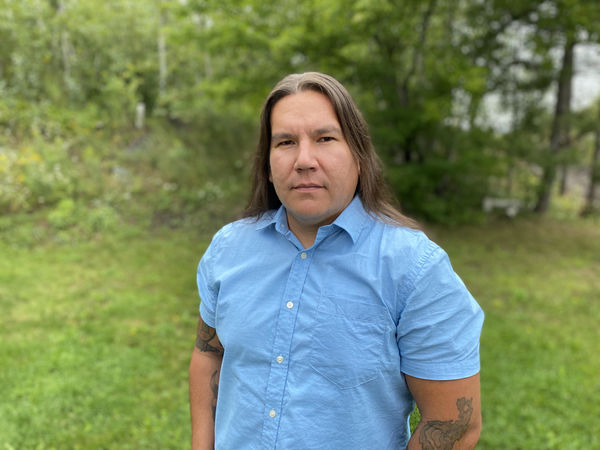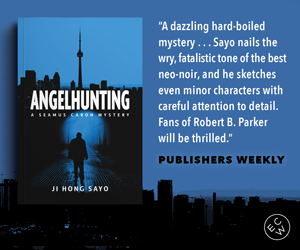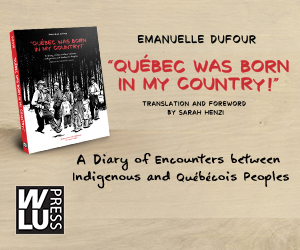Stories of the North
By Waubgeshig Rice
There’s no consensus on where Southern Ontario ends and Northern Ontario begins. Some say the French River north of Parry Sound is the unofficial border. Others believe the north begins at the town of Mattawa, while others still side with North Bay’s claim as the “Gateway of the North”. In reality, the specifics don’t really matter because it’s not an official jurisdiction. But in many professional, political, and social sectors, northern Ontario may as well be a different province altogether. It’s much smaller in population compared to the south, and its communities are distant. As such, it’s a region that’s often ignored and forgotten.
And that disregard extends to the arts, including the realm of Canadian literature. Despite diverse storytellers sharing vibrant stories from right across northern Ontario, their works are often overlooked by the cultural gatekeepers in the provincial capital to the south and other metropolitan centres heralded as artistic hubs in this country. There’s long been a big city bias in CanLit, and rural and northern writers haven’t really been accorded the respect and regard they deserve.
Nevertheless, northern Ontario is home to an array of brilliant authors, fledgling literary festivals, a publishing movement, and strong library communities that bring writers and readers together. It’s not a new phenomenon. Stories have been rooted in the land and spirit of the people here since time immemorial, and modern literary storytelling has thrived in this region for decades. Now, the writing community here is taking its rightful place in the wider literary discourse.
I’m proud to live in northern Ontario, and I’m honoured to be a part of the literary scene here. I grew up in Wasauksing on Georgian Bay, just south of one of those unofficial boundaries between north and south, so I never considered myself a northern Ontarian growing up. But my family and I moved to Sudbury in 2017 when I worked as a full-time journalist, and we have no plans to ever leave. As soon as I arrived, I was welcomed and embraced by the writing community here.
I quickly learned of the great things underway to support the literary arts in northern Ontario. Award-winning authors and poets have created a scene that is beautifully blossoming. Recently published works by these writers highlight voices that are proud to echo experiences from the land and its communities. Before the Usual Time: A Collection of Indigenous Stories and Poems is an anthology that features Indigenous storytellers with roots in the region like David Groulx, Emma Petahtegoose, and editor Darlene Naponse, along with others from around the world. Matt Mayr, who grew up in Manitouwadge, has a new novel out about the logging industry in northern Ontario and the families that rely on it. Kim Fahner, the former poet laureate of the City of Greater Sudbury, recently released a poetry collection called These Wings to critical acclaim. The list goes on.
Your CanLit News
Subscribe to Open Book’s newsletter to get local book events, literary content, writing tips, and more in your inbox
And a growing literary infrastructure is platforming and supporting these artists. There are festivals like Wordstock in Sudbury and Stories in the North in Thessalon that host writers from across the country. A publishing house called Latitude 46 has emerged with a focus on promoting northern voices. It has a growing book list of fiction, non-fiction, poetry, and more. There’s a handful of independent bookstores, making their homes in places like Dryden, Thunder Bay, New Liskeard, and North Bay. Libraries in cities like Thunder Bay and Timmins plan extensive community outreach with a focus on Indigenous culture and stories. And funders like the Ontario Arts Council have northern Ontario-specific programs and grants that are becoming increasingly competitive.
As an Anishinaabe and Canadian author, I’m excited to be able to contribute to the stories of this region. My ancestors through my father travelled along the north shore of Georgian Bay and Lake Huron for thousands of years. And the settlers I’m descended from through my mother eventually made their home in Kapuskasing. So my roots here run deep. My first novel is set in a First Nation along Highway 17, and my second takes place in far northern Ontario. My next book will continue there. And with that setting comes tremendous responsibility. I have the opportunity to humbly carry on a tradition to echo culture through stories right across this land. I am proud to be a part of the northern Ontario literary movement, and I’m eager to keep advocating for this land and these storytellers for the rest of my career.
It’s time for the rest of the province and the country to pay attention to this region. Northern Ontario has been overlooked for too long. Writing communities here are creating exciting works and contributing to a building movement. The stories from the land are thriving and bringing people together. I’m excited to share them.
The views expressed by Open Book columnists are those held by the authors and do not necessarily reflect the views of Open Book.
Waubgeshig Rice is an author and journalist from Wasauksing First Nation on Georgian Bay. He has written three fiction titles, and his short stories and essays have been published in numerous anthologies. His most recent novel, Moon of the Crusted Snow, was published in 2018 and became a national bestseller. He graduated from Ryerson University’s journalism program in 2002, and spent the bulk of his journalism career at CBC, most recently as host of Up North, the afternoon radio program for northern Ontario. He lives in Sudbury, Ontario with his wife and two sons.



